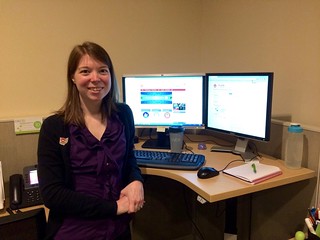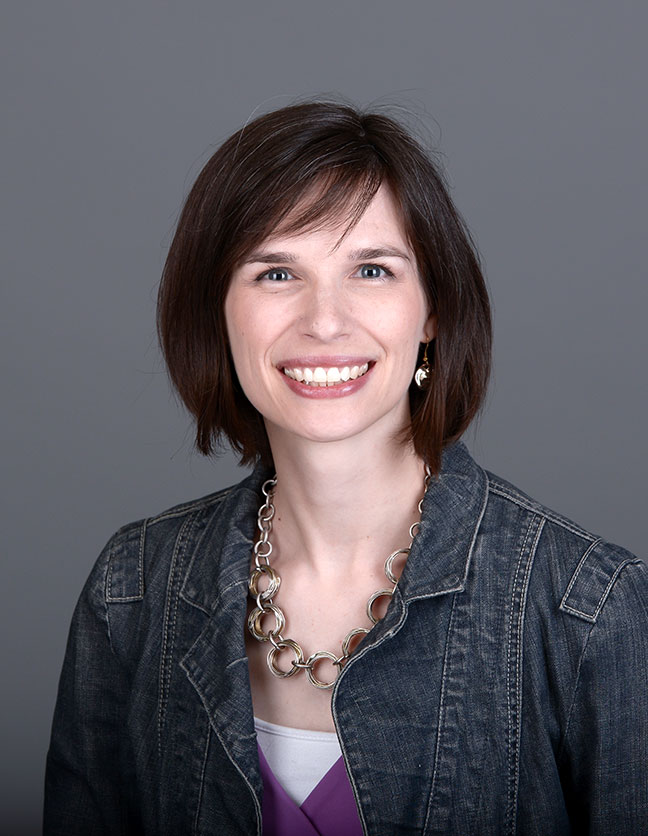
Editor’s note: We invited Lawrence alumni who have gone into library work to share with us what they do and how they got there. Here’s another in a series.
During my time at Lawrence, I chose a double degree in Vocal Performance and Art History that sent me bouncing between both sides of College Avenue on a daily basis, the Mudd Library frequently serving as a midway landing spot for late-night study sessions for art history exams and a place to pick up needed scores, song translations, and research books. I didn’t work in the library but had moments that cemented it as a space and resource that was incredibly valuable to me. For example, a music theory summer research assistantship required me to browse through dozens of CDs in the collection looking for excerpts, and I spent a semester tracking down historic newspaper clippings in a dark corner on the microform reader for Dr. Alexis Boylan. I still remember when Dr. Michael Orr mentioned in a paper advising meeting, “So, there’s this tool called Jstor that you might find helpful…” that sent me down a rabbit hole of hours of keyword experimentation.
As I moved through my fourth out of five years, I contemplated graduate school in art history and decided that a museum internship would be helpful for figuring out my next steps. As I was looking for opportunities I noticed one at the Newberry Library in Chicago that I almost bypassed, but a very wise Dr. Boylan advised me to “leave no stone unturned” if it intrigued me. This was the internship that ended up working out. Stepping into that beautiful architectural space with its amazing historic collections would be enough to sell anyone on the career path of librarianship, but I found I also enjoyed my projects working in the photoduplication department, which involved photographing really interesting historic sources and digitizing print records. My supervisors saw my interest and encouraged me to think more seriously about library school. As I started to explore what library school looked like, I realized that librarianship would allow me to take my arts disciplinary interests and apply them to the field, which sold me on the career path. During my final year at Lawrence Colette Brautigam hired me in the Visual Resources Center at Wriston, and I was able to do more of this interesting work in image management that was beginning to tip towards the digital, both photographing and mounting slides for teaching, but also scanning and cataloging them to convert to electronic form.
The grad school search resulted in me attending Indiana University Bloomington where I pursued both my Masters in Library Science and a Masters in Art History. After bouncing between a number of on-campus library jobs, I landed a paid internship at DePauw University in their Visual Resource Center, which both funded my graduate work and provided amazing professional opportunities. My supervisor and other librarian colleagues were incredibly generous in the opportunities they gave me, allowing me to partner in creative projects, teach, and present at professional conferences so that I could network with the wider field of library professionals. This job also taught me what I was not; it was primarily an image cataloging and digitization job, and I learned over the course of three years that I needed something more hands-on with students.
When I entered the job market, I looked for academic positions that would involve teaching, eventually landing the Research and Instruction position at Hope College that I have held for the last 10 years. I began as the humanities librarian but had the chance to pivot to the visual and performing arts after three years, again allowing me to apply my disciplinary passions to my work. It is wonderful working in a liberal arts environment, with students who are there to learn to be learners. My day-to-day work centers on classroom information literacy instruction, one-on-one research meetings with students and faculty, just in time support through our Research Help Desk, creation of digital research support tools, and collection development projects. My personal research interests center on how deeper knowledge of arts-specific research approaches can help libraries be more flexible supporters of creative scholarship. I also appreciate getting out of the library to connect with faculty and students and learn more about their interests. Participating in broader campus committees and projects over the years has allowed me to think more strategically about how libraries contribute to student learning. I also love not knowing what fascinating topic I’ll get to research on any given day. As Lawrence springboarded my journey as a life-long learner, it’s a privilege being in a field where I learn new things each and every day.
By Jessica Hronchek, Class of 2005
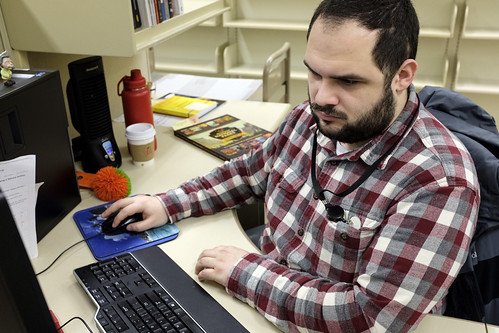
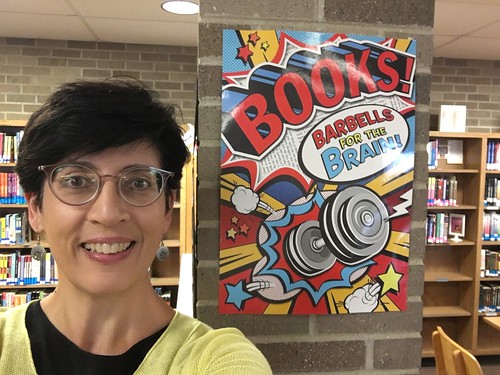 Editor’s note: We invited Lawrence alumni who have gone into library work to share with us what they do and how they got there. Here’s another in a series.
Editor’s note: We invited Lawrence alumni who have gone into library work to share with us what they do and how they got there. Here’s another in a series.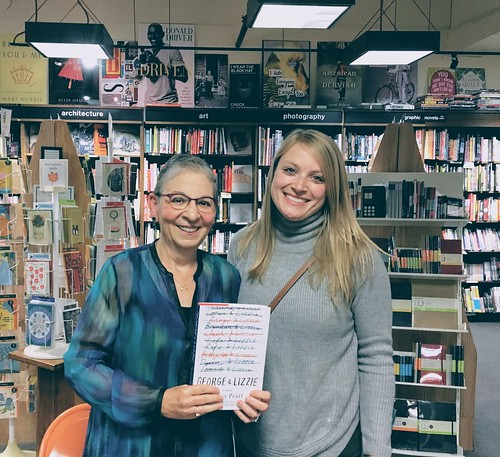
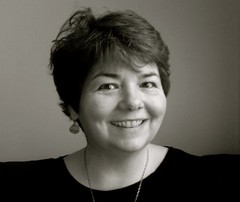
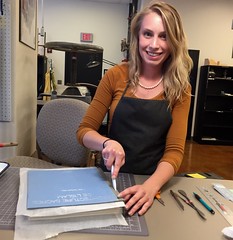 My path to librarianship has felt fluid and fated in many ways. With a multidisciplinary approach to a career in libraries, it is no wonder Lawrence has had such a huge impact on my path. I have always been a lover of books, spending much of my childhood and adult life immersed in literature and libraries. But it was fateful day at Lawrence University that set my sites on the world of books as my career.
My path to librarianship has felt fluid and fated in many ways. With a multidisciplinary approach to a career in libraries, it is no wonder Lawrence has had such a huge impact on my path. I have always been a lover of books, spending much of my childhood and adult life immersed in literature and libraries. But it was fateful day at Lawrence University that set my sites on the world of books as my career.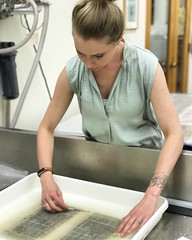
 Editor’s note: We invited Lawrence alumni who have gone into library work to share with us what they do and how they got there. Here’s another in a series.
Editor’s note: We invited Lawrence alumni who have gone into library work to share with us what they do and how they got there. Here’s another in a series. 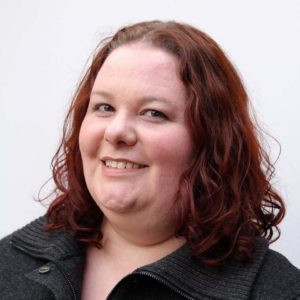 Editor’s note: We invited Lawrence alumni who have gone into library work to share with us what they do and how they got there. Here’s another in a series.
Editor’s note: We invited Lawrence alumni who have gone into library work to share with us what they do and how they got there. Here’s another in a series. 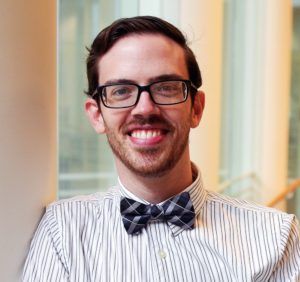 Editor’s note: We invited Lawrence alumni who have gone into library work to share with us what they do and how they got there. Just in time for reunion, here’s another in a series.
Editor’s note: We invited Lawrence alumni who have gone into library work to share with us what they do and how they got there. Just in time for reunion, here’s another in a series. 